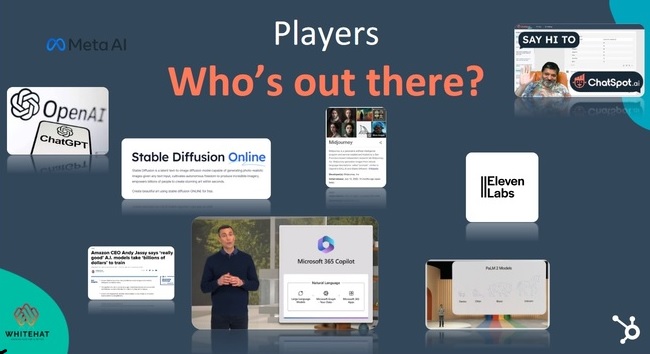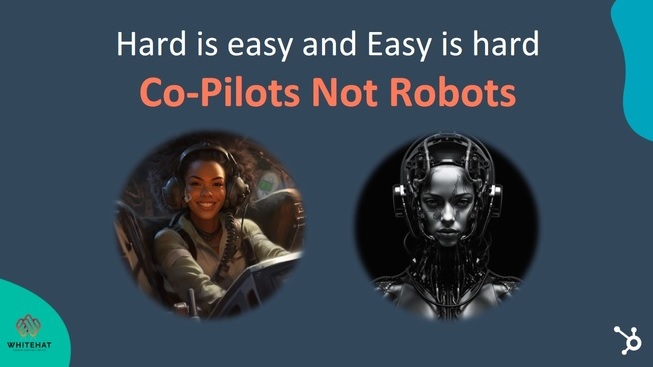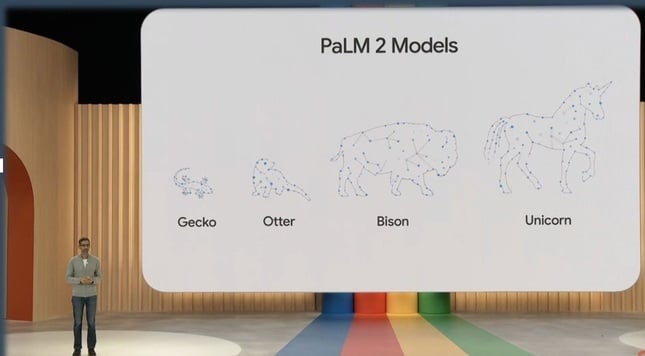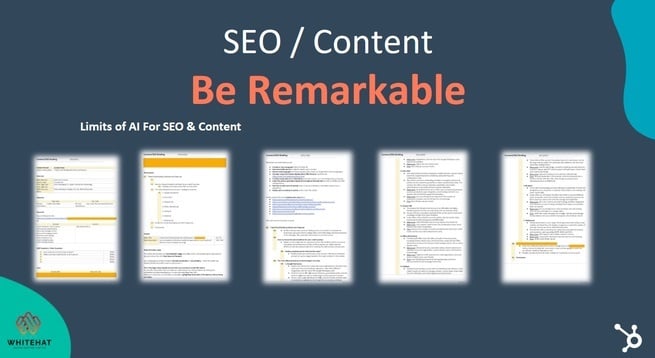AI Marketing Future: Revolutionizing Strategies and Tools
- Home
- AI Marketing Future: Revolutionizing Strategies and Tools
Picture a world where the AI marketing future is now. AI and ML are transforming the marketing sector, requiring advertisers to adjust their approaches in order to stay ahead of the game. As a result, marketers must adapt their strategies to stay ahead of the curve.
So, how can you leverage AI to stay ahead of the competition?
This blog post will explore various aspects of AI in marketing, from its impact on game-playing programs like AlphaGo to how it's being integrated into social media platforms. We'll delve into cutting-edge concepts such as Co-Pilot applications and discuss emerging trends like virtual metaverses through image recognition models.
As we navigate the complexities of data privacy concerns surrounding AI applications, we'll also examine innovative solutions like fine-tuning legal chatbots using open-source models. All these topics and more await you in our exploration of the exciting potential of the AI marketing future.
Table of Contents:
- The Rise of AI in Marketing: Embracing the Future
- Co-Pilot Concept and Its Applications
- Fine-Tuning Legal Chat Bots Using Open Source Models
- Integration of AI Systems into Social Media Platforms
- HubSpot and API Integration for Seamless Marketing Automation
- Conversational Interfaces in Marketing Platforms: Enhancing User Experience
- Content Creation Using GPT Technology: The Future of Marketing
- Data Privacy Concerns Surrounding AI Applications
- Building Virtual Metaverses Through Image Recognition Models
- FAQs in Relation to Ai Marketing Future
- Conclusion
The Rise of AI in Marketing: Embracing the Future

Artificial intelligence (AI) has come a long way, with groundbreaking applications like AlphaGo and DeepMind showcasing its potential to revolutionize various industries.
In the marketing industry, AI is set to transform how businesses engage with customers and optimize their strategies.
The Impact of AlphaGo on Game-Playing Programs
AlphaGo's victory over world champion Go player Lee Sedol demonstrated that AI can outperform humans in complex tasks. This breakthrough inspired marketers to explore new ways of leveraging machine learning algorithms within their campaigns.
DeepMind's Contribution to Understanding the Human Proteome
DeepMind's recent success in protein folding prediction, known as AlphaFold, highlights the power of advanced neural networks in solving intricate problems. This achievement opens up possibilities for utilizing similar technologies in marketing analytics and customer segmentation efforts.
- Analyze your current marketing strategy and identify areas where AI could enhance efficiency or effectiveness.
- Educate yourself on available AI tools designed specifically for marketers, such as chatbots or predictive analytics platforms.
- Create an implementation plan outlining how you will integrate these technologies into your existing processes while maintaining a human touch.
- Stay up-to-date with the latest advancements in AI and machine learning to ensure your marketing efforts remain cutting-edge.
Ready for more insights on how AI can elevate your marketing game?
As we continue exploring the potential of AI in marketing, it's essential to stay informed about emerging technologies and their practical applications. Utilizing AI marketing tools can enable you to make decisions based on data, interact with customers, and gain insight into their behavior and preferences. With AI revolutionizing marketing, it's increasingly important for businesses to automate data analysis and improve customer experience and engagement through natural language processing and other AI algorithms.
The future is here, and it's time for marketers like you to embrace these powerful tools.
Artificial intelligence (AI) is set to transform the marketing industry by leveraging machine learning algorithms within campaigns. DeepMind's recent success in protein folding prediction highlights the power of advanced neural networks, opening up possibilities for utilizing similar technologies in marketing analytics and customer segmentation efforts. It's important for businesses to automate data analysis and improve customer experience through natural language processing and other AI algorithms.
Co-Pilot Concept and Its Applications

Let's talk about the future of AI in the marketing industry.
Enter Microsoft's co-pilot concept, a revolutionary idea that envisions artificial intelligence working alongside humans rather than replacing them.
This could be a real opportunity for marketers.
How Microsoft Researchers Used ChatGPT-4 for Creative Tasks
Microsoft researchers have been experimenting with ChatGPT-4, an advanced language model, to assist in creative tasks such as writing code or designing websites.
The results? Impressive collaboration between humans and AI systems.
Collaborative Benefits Between Humans and AI Systems
Imagine harnessing the power of artificial intelligence to enhance your marketing campaigns while maintaining that essential human touch.
- Faster insights: With AI analyzing customer data at lightning speed, you can make data-driven decisions more quickly than ever before.
- Better targeting: By leveraging predictive analytics and machine learning algorithms, you can identify your target audience and tailor content specifically for them.
- Creative assistance: Let AI handle mundane tasks (like scheduling social media posts) so you can focus on crafting compelling messages that engage customers and improve customer experience.
Implementing AI tools in your marketing strategy can revolutionize the way you engage with customers and provide insights into customer behaviour.
In conclusion, the co-pilot concept holds immense potential for marketers seeking to optimize their strategies and engage with customers on a deeper level. Embrace this innovative approach, and watch your marketing campaigns soar.
Autonomous Systems and Alignment Problems
As autonomous systems become more prevalent, it's crucial to address alignment problems to ensure that these technologies align with our goals without causing unintended consequences.
One example of this includes limiting access to the internet when creating autonomous entities like chatbots or task assistants.
Google's Palm 2 Experiment Involving TaskRabbit Hiring

In Google's Palm 2 experiment, researchers demonstrated the importance of considering alignment issues in AI development.
Their goal was to create an AI system capable of autonomously hiring a TaskRabbit worker while preventing malicious uses or mistakes due to misalignment with human values.
Safeguarding Against Malicious Uses of Autonomous Technology
To protect against potential misuse, it's essential to implement safeguards within AI systems themselves and regulate their deployment in various industries.
OpenAI's research on safety measures is one such initiative aimed at developing robust solutions for mitigating risks associated with powerful AI applications.
By addressing alignment problems proactively, we can ensure that AI-driven autonomous systems contribute positively to our lives and businesses without causing harm or unintended consequences.
Partnership on AI is an excellent resource for learning more about the responsible development and deployment of artificial intelligence technologies in various sectors, including marketing.
Fine-Tuning Legal Chat Bots Using Open-Source Models
Legal chatbots are gaining traction due to their expedient help for users. How can we further improve legal chatbots? The answer lies in open-source models like Gecko.
Benefits of Integrating Open-Source Models into Existing Platforms
By incorporating these models, legal chatbots can be fine-tuned for improved accuracy and efficiency. This means that clients receive more precise information without wasting time on irrelevant details.
Potential Use Cases Beyond Legal Services
Beyond law firms, this technology has implications across various industries where specialized knowledge is required.
- Evaluate your current chatbot system - is it meeting the needs of your users?
- If not, consider exploring open-source models like Gecko to enhance its capabilities.
- Analyze potential applications within other sectors of your business or industry - could a fine-tuned AI-powered assistant benefit those areas too?
Now you know how leveraging advanced AI tools such as Gecko can take your legal chatbot (and potentially other aspects of your business) to new heights. So go ahead and explore the possibilities.
Integration of AI Systems into Social Media Platforms
Social media platforms are continually advancing, and the incorporation of AI can bring them to unprecedented heights.
How, you ask?
Personalized Content Recommendations Using AI Algorithms
Firstly, by offering personalized content recommendations based on individual preferences.
AI algorithms analyze user behaviour and interests to provide tailored suggestions that keep users engaged for longer periods.
This means more relevant content for your audience and increased visibility for your brand.
Enhancing User Interactions with Chatbots on Social Media
Moving on to chatbots - they're not just a passing trend.
In fact, Gartner predicts that by the end of 2023, customers will manage 85% of their relationship with an enterprise without interacting with a human.
Astonishing, right? How does this trend of no human interaction affect social media?
- Better Customer Service: Chatbots offer instant responses to customer queries around the clock. Say goodbye to long waiting times.
- Data Collection: They gather valuable insights about user preferences which help improve marketing strategies over time.
- Increased Engagement: Chatbots can initiate conversations, driving user engagement and fostering brand loyalty.
Intrigued by the potential of AI in social media marketing?
Discover more ways AI is revolutionizing marketing here.
To sum up, integrating AI systems into your social media strategy can lead to a better user experience and improved results for your business.
HubSpot and API Integration for Seamless Marketing Automation
Let's talk about HubSpot, a game-changer in marketing automation.
This powerful platform can integrate APIs into other systems, revolutionizing the way we approach our campaigns.
So, how can this benefit you?
Future Possibilities for Further Integration Across Platforms
The sky's the limit when it comes to API integration possibilities.
Innovative marketers are always seeking new ways to improve efficiency and maximize campaign potential through interconnectedness.
- Create personalized email campaigns using data from multiple sources like e-commerce platforms or customer surveys.
- Synchronize user information between different tools such as project management software or support ticketing systems.
- Analyze cross-channel performance metrics by linking analytics tools together for comprehensive reporting capabilities.
Actionable Steps You Can Take Today.
Bonus Tip: Don't forget to keep an eye on emerging AI technologies that could further revolutionize marketing automation.
Conversational Interfaces in Marketing Platforms: Enhancing User Experience
Let's talk about conversational interfaces.
You know, those nifty tools that transform text-based inputs into spoken conversation?
Well, they're not just for chatting with friends anymore.
Stable Diffusion, a front-end interface that leverages natural language processing, is changing the game for marketing platforms like HubSpot.
How Stable Diffusion Improves User Engagement
Imagine this:
You're interacting with your favorite marketing tool through simple conversations instead of navigating complex menus and buttons.
Pretty cool, right?
This approach enhances user engagement by making it easier to access information and perform tasks within the platform.
Expanding Access to Marketing Tools Through Conversational Interfaces
But wait - there's more.
Beyond improving user experience, Stable Diffusion can also increase accessibility for various demographics who may struggle with traditional interfaces.
Elderly users or those with disabilities could find these conversational systems much more intuitive and accommodating.
So how do you get started?
First, explore existing chatbot solutions tailored specifically for marketing platforms.
Once you've explored existing chatbot solutions, consider incorporating AI-powered voice assistants like Amazon Alexa or Google Assistant into your marketing strategies to stay ahead of the curve.
Finally, keep an eye on emerging technologies and trends in the conversational interface space to stay ahead of the curve.
By adopting these advanced technologies, not only can you improve your promotional campaigns but also provide a more inclusive experience for all types of users.
Content Creation Using GPT Technology: The Future of Marketing

Let's face it, creating engaging, high-quality content can be time-consuming and challenging. But what if I said there's a revolutionary technology coming? Welcome to the world of GPT (Generative Pre-trained Transformer).
GPT-assisted content generation starts with prompt engineering - crafting input prompts that guide AI models like ChatGPT towards desired outputs. The potential applications for GPT technology go far beyond writing tasks alone. From email drafting and scheduling to social media post creation, product descriptions and reviews, and user-generated content moderation, the possibilities are endless.
Implementing GPT technology in your marketing strategy can provide numerous benefits, including increased productivity by automating repetitive tasks, creating more personalized marketing materials tailored to your audience, and easily generating multiple variations or iterations for A/B testing purposes.
How Can You Get Started With GPT?
To begin exploring this exciting technology, check out platforms like OpenAI or experiment with GPT-3 powered tools such as Copy.ai. Although GPT is still developing, it has the potential to revolutionize content creation in marketing and should not be overlooked. But it's definitely worth keeping an eye on for the future of marketing content creation.
Data Privacy Concerns Surrounding AI Applications
As we embrace the power of artificial intelligence, it's crucial to address data privacy concerns.
With more information being collected and processed by AI systems, responsible handling of personal data is paramount.
Let's explore some strategies for maintaining trust while leveraging AI advancements in marketing.
Balancing Innovation with Ethical Considerations Around Data Use
Innovation should never come at the expense of ethical practices in handling user data. The marketing industry must prioritize the responsible use of customer data to avoid negative consequences.
The General Data Protection Regulation (GDPR) provides guidelines on using AI responsibly. To ensure compliance, consider conducting a Data Protection Impact Assessment (DPIA).
Strategies for Maintaining Trust While Leveraging AI Advancements
- Anonymize Data: Utilize techniques like pseudonymization or aggregation to protect users' identities when processing their information through an AI system. This will help to maintain customer trust and protect their privacy.
- Create Transparent Policies: Clearly communicate your company's approach to collecting and utilizing customer data. Make sure users understand how their information will be used and protected. Building trust with your audience is essential to ensuring user data is properly handled and protected.
- User Consent Management: Implement mechanisms that allow users to provide informed consent before sharing their personal details with your organization or any third-party partners involved in your AI initiatives. This will help to ensure that users are aware of how their data is being used and can make informed decisions about sharing it.
- Implement Security Measures: Employ robust security measures to safeguard user data from unauthorized access, leaks, or breaches. Regularly update these protocols to stay ahead of emerging threats. This will help to protect customer data and maintain their trust in your organization.
Incorporating ethical considerations and best practices into AI marketing can not only safeguard users' privacy but also foster trust with the public. Revolutionizing marketing with AI tools and machine learning algorithms is increasingly important, but it must be done responsibly.
Remember: maintaining a balance between innovation and responsible data use is key to unlocking the full potential of artificial intelligence in marketing.
To fully leverage AI advancements in marketing, it's important to address data privacy concerns and prioritize responsible use of customer data. Strategies for maintaining trust include anonymizing data, creating transparent policies, implementing user consent management mechanisms, and employing robust security measures. Balancing innovation with ethical considerations around data use is crucial for unlocking the full potential of artificial intelligence in marketing.
Building Virtual Metaverses Through Image Recognition Models
Are you ready to dive into the future of marketing?
Let's explore how advancements in image recognition models, such as those released by Facebook, are paving the way for virtual metaverses.
These immersive environments have massive potential to revolutionize your marketing strategies.
The Role of Image Recognition in Constructing Virtual Worlds
First things first:
To build a convincing and engaging virtual world, we need advanced image recognition technology.
Advanced image recognition technology enables the development of highly realistic virtual environments which people can interact with and explore.
Facebook's recent announcement about its investment in AI-powered image recognition is just one example of this trend gaining momentum.
Opportunities for Marketers within Emerging Metaverse Platforms
Moving on:
The rise of these virtual worlds presents unique opportunities for marketers like you.
- Create Immersive Brand Experiences: Engage customers through interactive experiences tailored specifically to your target audience, making them feel more connected with your brand than ever before.
- Leverage Customer Data Insights: Harness the power of customer data to personalize marketing campaigns within the metaverse, driving customer engagement and loyalty.
- Collaborate with Influencers: Partner with virtual influencers or create your own avatar spokesperson to promote your products in a whole new way.
- Innovative Advertising Methods: Utilize digital advertising techniques that blend seamlessly into the metaverse environment, capturing users' attention without disrupting their experience.
The possibilities are endless.
To stay ahead of the curve, start exploring how you can incorporate virtual metaverses into your marketing strategy today.
You never know - it might just be the game-changer you've been looking for.
FAQs in Relation to Ai Marketing Future
What is the future of marketing with AI?
The future of marketing with AI involves leveraging advanced technologies like GPT, image recognition, and conversational interfaces to create personalized content, enhance user engagement, and automate tasks. As AI systems continue to evolve, marketers will need to balance innovation with ethical considerations surrounding data privacy and trust.
How will AI impact marketing in 2023?
In 2023, AI is expected to play a significant role in enhancing customer experiences through personalization algorithms and chatbots on social media platforms. Additionally, integration across various tools using APIs will streamline marketing automation processes while emerging metaverse platforms offer new opportunities for creative campaigns.
What will the impact of AI be on the marketing industry?
AI's impact on the marketing industry includes automating repetitive tasks, enabling more targeted advertising, improving audience segmentation, generating insights from large datasets, creating dynamic content based on user behavior, optimizing pricing strategies, enhancing customer support through chatbots, and opening up new avenues for immersive brand experiences.
Is AI going to take over marketing?
No, rather than taking over completely, AI is poised to augment human expertise by automating mundane tasks and providing valuable insights. This collaboration between humans and machines enables marketers to focus more on strategy development while utilizing technology-driven solutions for improved efficiency.
Conclusion
As we explore the rise of AI in marketing, it's clear that this technology is poised to revolutionize the industry. From chatbots and conversational interfaces to content creation and data privacy concerns, there are many exciting developments on the horizon.
While there are certainly challenges to overcome, such as alignment problems and potential misuse of autonomous systems, marketers who embrace AI will be well-positioned for success in the future. By leveraging these technologies intelligently and ethically, companies can achieve their growth targets even with limited internal resources.
To learn more about how Whitehat can help your company stay ahead of the curve when it comes to AI marketing future trends, contact us today.

